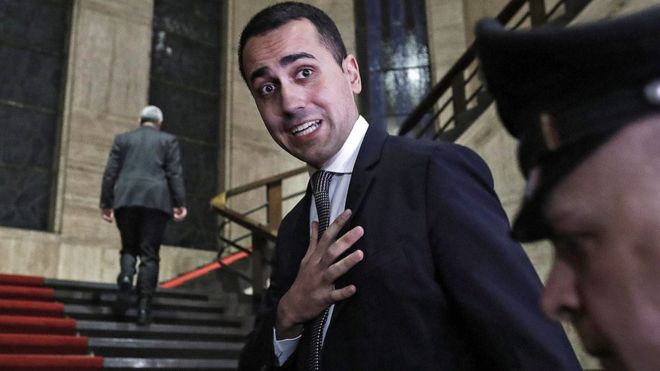
Luigi di Maio accused France of fuelling migration by damaging the economies of African states
France has summoned Italy’s ambassador after the Italian deputy prime minister accused the French of exploiting Africa and fuelling migration.
On Sunday, Luigi di Maio called on the European Union to impose sanctions on France for its policies in Africa.
He said France had “never stopped colonising tens of African states”.
Italy’s populist leadership has repeatedly clashed with France in recent months, on issues such as migration, protests and culture.
As Prime Minister Giuseppe Conte tried to soothe the row on Tuesday, highlighting the two countries’ “solid friendship”, right-wing Interior Minister Matteo Salvini appeared to intensify it, condemning France’s Emmanuel Macron as a “terrible president”.
Why are these neighbours arguing?
Ever since Italy’s Five Star and League parties came to power in June 2018 relations have been tense.
Much of the tension has been about migration. The two countries have argued over France sending back migrants across Italy’s northern border.
When France criticised Italy for not allowing rescue boats carrying migrants in the Mediterranean to dock, Italy responded by accusing France itself of refusing to accept migrants.
But the rows have spilled into other areas.
Right-wing Interior Minister Matteo Salvini accused France last week of harbouring 14 “terrorists” wanted by Italy, after a fugitive ex-militant was extradited from Bolivia. He said they should be sent back to Italy to end up in jail, rather than “quaffing champagne under the Eiffel Tower”.
Coalition colleague Mr Di Maio, leader of the Five Star Movement (M5S) has found common cause with France’s “gilets jaunes” protesters, urging them not to give up and offering them “the support you need”.
What did Di Maio say?
He made his latest comments during a visit to central Italy at the weekend.
It came as the UN said about 170 migrants were feared drowned in two separate Mediterranean shipwrecks.
“The EU should impose sanctions on France and all countries like France that impoverish Africa and make these people leave, because Africans should be in Africa, not at the bottom of the Mediterranean,” he said.
“If people are leaving today it’s because European countries, France above all, have never stopped colonising dozens of African countries.”
He said if it wasn’t for Africa, France would rank 15th among world economies, not in the top six.
The Italian ambassador to France, Teresa Castaldo, was summoned to the foreign ministry in Paris on Monday.
French diplomatic sources quoted by Italian news agency Ansa called Mr Di Maio’s remarks “hostile and without cause given the partnership between France and Italy in the European Union”.
Mr Di Maio, who is also labour and economy minister, was unrepentant.
He accused France of manipulating the economies of African countries that use the CFA franc, a colonial-era currency backed by the French treasury.
“France is one of those countries that by printing money for 14 African states prevents their economic development and contributes to the fact that the refugees leave and then die in the sea or arrive on our coasts,” he said.
“If Europe wants to be brave, it must have the courage to confront the issue of decolonisation in Africa.”
Mr Salvini agreed, labelling France as “one of those countries” that take Africa’s wealth away.
What is the CFA franc?
France says the CFA franc is a guarantee of financial stability but others have attacked it as a colonial relic and opposition to it has grown in recent years.
The CFA franc is split into two zones, in eight countries that make up the West African Economic and Monetary Union and a further six in the Central African Economic and Monetary Community.
Dating back to December 1945, when it was tied to the French franc, the CFA franc has since 1999 been pegged to the euro. Currently a euro is worth 656 CFA francs.
While the French central bank guarantees the currency, the 14 countries that use it have to deposit half their foreign exchange reserves in a French treasury account.
Supporters point to the currency’s stability and credibility.
Critics say many of the 14 countries that use the CFA franc are impoverished and complain that it holds back economic and political development. In 2017, controversial Franco-Beninese activist Kémi Séba was thrown out of Senegal after he burned a 5,000 CFA note.
Source: BBC























